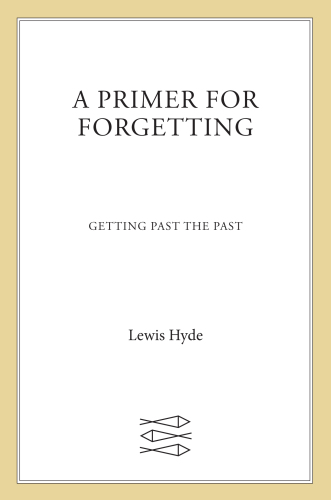
A Primer for Forgetting
Getting Past the Past
کتاب های مرتبط
- اطلاعات
- نقد و بررسی
- دیدگاه کاربران
نقد و بررسی

April 15, 2019
Transformation, creativity, and philosophical liberation all may involve relinquishing memory. While many people try brain games, exercise, and food supplements in hopes of preventing memory loss, MacArthur fellow Hyde (Creative Writing/Kenyon Coll.; Common as Air: Revolution, Art, and Ownership, 2010, etc.) inquires into the power of forgetting. Declaring himself "weary of argument, tired of striving for mastery, of marshaling the evidence, of drilling down to bedrock to anchor every claim, of inventing transitions to mask the jumpiness of my mind," he instead gives free rein to that inspired jumpiness by juxtaposing anecdotes, stories, meditations, and aphorisms about the meaning of forgetfulness. Illustrated with artwork from an imaginary Museum of Forgetting, the author's collage of entries comes from a rich trove of philosophy, mythology, ancient and modern literature, religion, psychology, art, and history as well as his own life, including witnessing his mother's dementia. Forgetting, he discovers, does not necessarily imply loss. For Emerson, "self-forgetting" was essential for personal self-renewal and cultural reinvention. Philologist Ernest Renan believed that collective amnesia contributed to "the essence of a nation." Robert E. Lee advised his contemporaries "to obliterate the marks of civil strife and commit to oblivion the feelings it engendered" in order to move into the future. Amnesties--judicial forgetting--appear in nations recovering from the trauma of war or human rights abuses. South Africa's Truth and Reconciliation Commission requires a detailed recollection of crimes as part of an amnesty petition that, if granted, serves the state as "a cold forgetting, expedient and instrumental." Public monuments, Hyde asserts, "often become invisible," so that people "can turn away from the past." Considering the connection of memory to creativity, the author finds that many artists, composers, and writers seek "the delight or anxiety of fresh perception" rather than "the comfort or dullness of the habitual." "Remembering betrays Nature," wrote the Portuguese poet Fernando Pessoa. "Because yesterday's Nature is not Nature. / What's past is nothing and remembering is not seeing." Amnesia, nostalgia, forgiveness, retribution, and the mining of memory in psychoanalysis--Hyde considers all these and more. An eclectic and insightful miscellany of playful, spirited, provocative reflections.
COPYRIGHT(2019) Kirkus Reviews, ALL RIGHTS RESERVED.

April 29, 2019
In this delicate, allusive thought experiment, literary critic Hyde (The Gift) probes the idea of forgetting as a positive act. He ponders three major themes: ways to release a personal trauma, as in the story of an African-American man who publicly accepted a plea for forgiveness from one of his brother’s Klansmen killers; ways of moving past collective traumas, such as through the amnesty for atrocities granted through post-apartheid South Africa’s Truth and Reconciliation Commission; and the act of self-forgetting, “a technique to help us shed... the mind’s buffering blubber of routine.” Hyde draws on widely varied references, including Nietzsche and Kierkegaard, literary luminaries that include Nabokov and Borges, and, most fruitfully, classical literature—he compares the avenging Furies of ancient Greek tragedy to the “restless, intrusive Unforgettable” of America’s history of racial violence. Venturing outside Western culture, he also finds a luminous truth in the Buddhist notion that real awakening comes when one forgets everything but the present moment. An elegant exercise in philosophy and form, Hyde’s meditation on forgetting as an act of clarity offers stimulating contemplation of the odd paradox that “memory and oblivion... cannot function unless they work together.”

Starred review from May 1, 2019
Poet-essayist Hyde (Common as Air, 2010) celebrates forgetting as a force for creative potency, personal growth, and social justice, and in doing so reminds us of his talent for intellectual synthesis and his restless, contrarian spirit. The ancients, suggests Hyde, understood that memory and forgetting are mutually dependent; according to Plato, we spend our lives trying to recover that which we once knew, before birth. Nietzsche famously viewed amnesia as an unburdening from the weight of history. We, too, might recognize that beneficent forgetting, while not a substitute for forgiveness or an excuse to ignore past injustice, permits us to heal emotional wounds, repair damaged interpersonal relationships, and make meaningful art. We see this dynamic at work in post-conflict reconciliation processes and in friendships between crime victims and perpetrators. It is an essential ingredient in the patriotism that binds disparate populations. But Hyde's thesis?less a structured argument than an aggregation of loosely related anecdotes and observations, collected scrapbook-style?transcends simple polemic. Rather, in the way of Zen Buddhism, it's an invitation to forget our very selves so that we might finally see the universe clearly. And alongside all of the bright-burning erudition, there is a very moving personal angle: his mother's progressive dementia and the prospect of his own.(Reprinted with permission of Booklist, copyright 2019, American Library Association.)

























دیدگاه کاربران